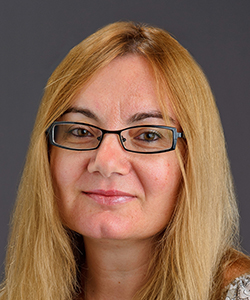Carmen Cirstea, MD, PhD is so correct that most treatments don't treat the brain problem. But I'm not sure is she is going to be treating the brain problem that causes a lot of the arm problems. Like preventing these 5 causes of the neuronal cascade of death in
the first days. Less dead brain would certainly mean much better recovery.
American Heart Association Awards Grant to School of Medicine Researcher
An MU School of Medicine researcher in the Department of Physical Medicine and Rehabilitation has earned a $300,000 grant from the American Heart Association to investigate new and better ways to treat arm weakness after a stroke.
Stroke is the major cause of an acquired lifelong physical disability. Arm weakness is a common outcome in most patients immediately after a stroke and continues in more than half of those patients even after rehabilitation. This consequence seriously affects the patient’s quality of life.
Rapid growth of the elderly population combined with higher stroke survival rates is expected to lead to a growing population of stroke patients over the next decades, increasing the importance of treating arm weakness to improve lives.

“Arm
weakness may be hard to treat after stroke because the treatments that
are normally used do not treat the brain problem,” said grant recipient Carmen Cirstea, MD, PhD,
assistant research professor. “We think people who have had a stroke
have higher levels of inhibition of the brain areas that control the
weak arm. These brain changes may cause poor recovery of arm weakness.”(I disagree, my problem in dead brain, not inhibition!)
Dr. Cirstea’s research will test whether inhibition of these brain areas is high early after a stroke and if the brain is able to recover over the first three months after the stroke onset. The three-month window was chosen due to the great potential of the brain to recover during this time, either naturally or with the support of rehabilitation.
This project will also study the relationships between these brain changes and changes in arm weakness to predict which patients might benefit most from rehabilitation.
“The results of this study will reshape our understanding of the neural events underlying brain remodeling after stroke and their relationship to arm recovery,” Cirstea said. “Such understanding will provide the foundation for augmenting recovery through targeting brain inhibition, for example, using neurostimulation. We hope to use these findings to design or modify current stroke treatments to prevent disability due to arm weakness.”
The American Heart Association grant runs through June 2025.
No comments:
Post a Comment